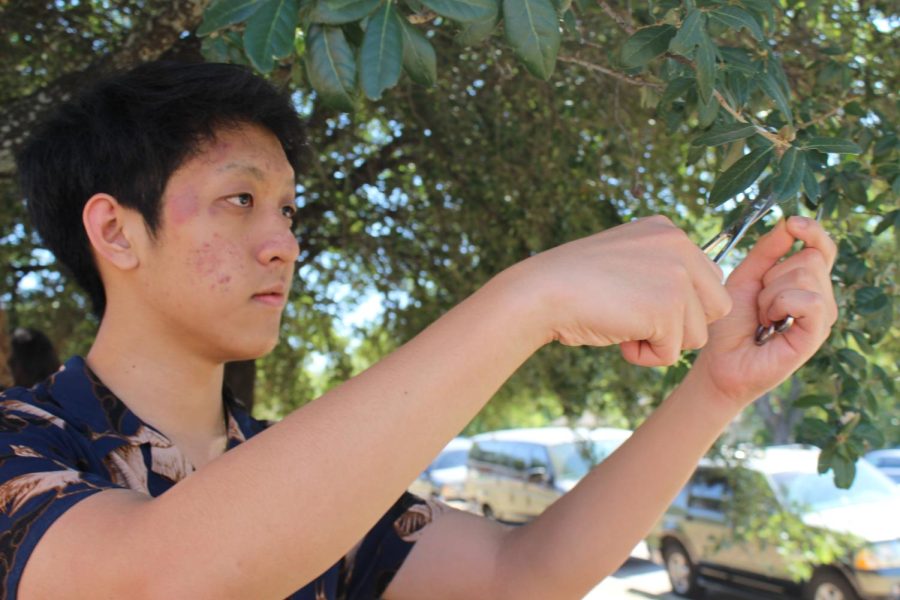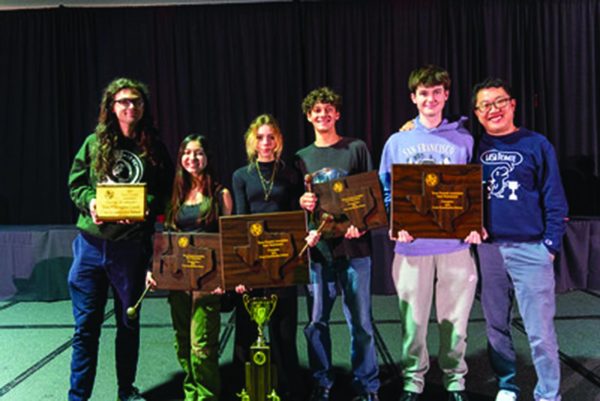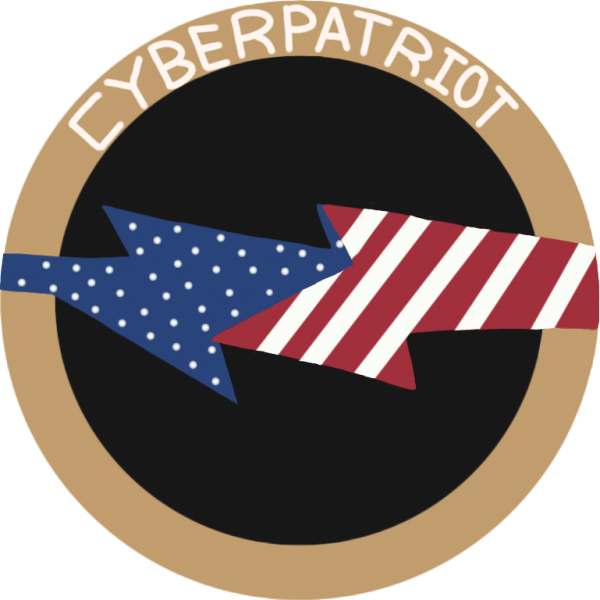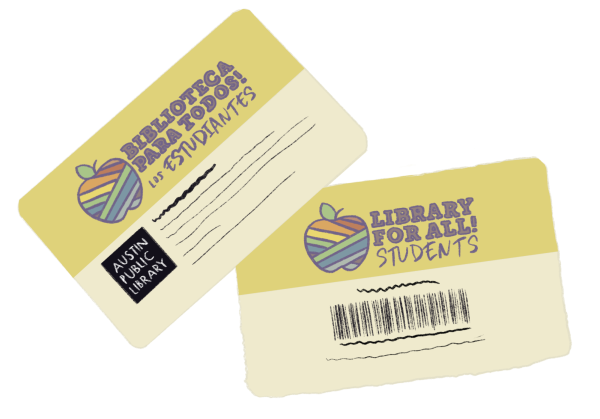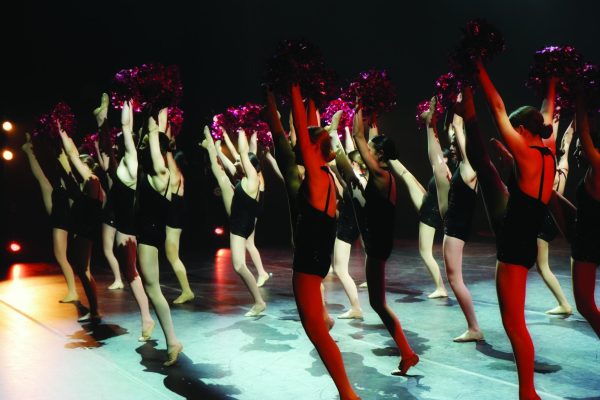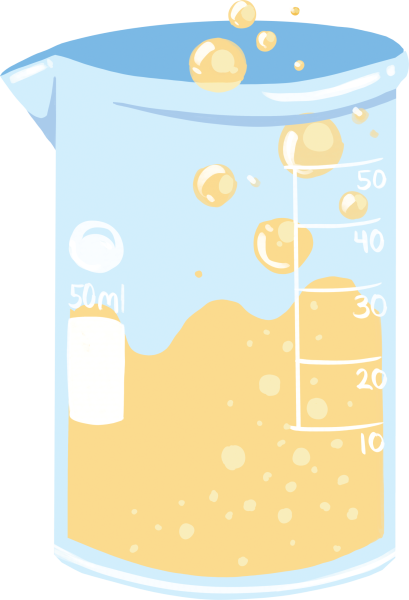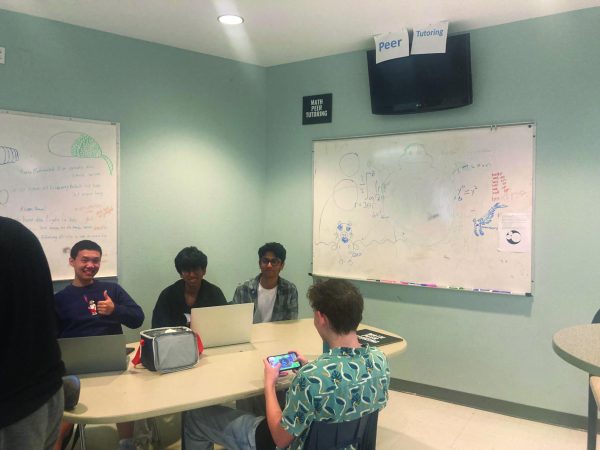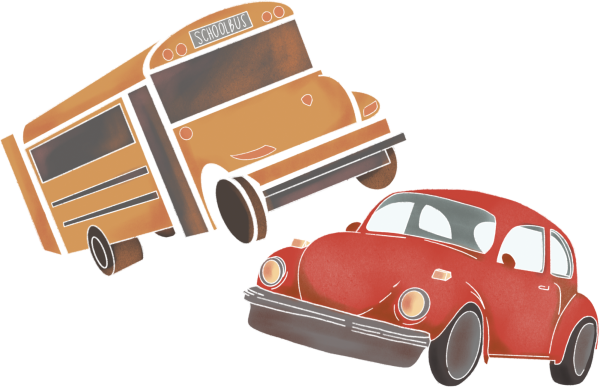Biotech Students Splice Up Internships
OUT IN THE FIELD: Jon Tor collects samples of leaves. He will use these for his biotech project. photo by JC Ramirez Delgadillo
November 7, 2022
LASA’s Biotechnology Internship course provides students the opportunity to work on projects with college professors and other professionals in the field. Biotechnology can either be taken as a LASA course with dual credit from the Austin Community College (ACC) during senior year, or solely at ACC after graduation. During the course, students have the opportunity to intern for about two hours for three days a week at a company. They’re required to work at least 60 hours per semester, which gives students real-world experience.
Before the internship, students are required to take a year-long introductory biotechnology course along with a summer course on the creation of biotechnology products. Biotechnology teacher Joseph Oleniczak said the introductory biotechnology class is a lab-based class that helps students gain knowledge about biotechnology techniques and skills needed in internships.
“In the fall semester, we focus mostly on DNA technologies and lab skills to students who are learning about the structure of DNA and how to manipulate DNA using molecular techniques,” Oleniczak said, “and the spring semester, we focus mostly on protein technologies and bioinformatics, as well as other molecular techniques associated with those.”
With the knowledge of the techniques, students who take the internship course usually work at UT or industry labs to gain experience in the field. According to Oleniczak, there are a variety of different biotech companies that they can use to decide where to apply to.
“I can think of three off the top of my head that are working at labs at UT,” Oleniczak said, “and then the other 14 people who are off campus are working at different companies.”
While eighth-period students intern off-campus, the fourth-period classes have the option to intern on-campus. Senior Jimena Martinez is a current biotechnology student at LASA and is taking advantage of a new opportunity available to students taking this course.
“This year, Mr. Oleniczak added an option; rather than you asking another organization or company for an internship, you could do it in class,” Martinez said. “So it’s something unique to the course where instead of going out to another company and interning for them, you get to create your own project with the resources that he provides.”
The on-campus internship class focuses on a biodiversity barcoding project of their choice. According to Oleniczak, the students get to design everything about their project: from who they work with to what they’re researching.
“Students for that project are dividing into teams, and they’re coming up with their own research question,” Oleniczak said. “Then they’re reaching out to local experts: either professors at the University of Texas, local people in industry, or people who work for Austin Parks and Rec.”
Even the students who will take the on-campus course will end up sampling their specimens off-campus, for the most part. But one group is electing to do their entire project at LASA.
“Some people in my class want to sample all of the plants from our school,” Martinez said, “so they are just gonna do a census of all the different species here, which I think is pretty cool.”
All students complete the same process of extracting DNA, regardless of where they collect their samples. Oleniczak helps his students learn how to use equipment most of them have never seen before, like sequencing machines. Polymerase Chain Reaction (PCR), for example, is a technique where DNA segments are copied hundreds of times, so that the fragments can then be put through a DNA sequencer to determine the nucleotide bases.
“They can extract DNA from them, amplify them at a barcode region using PCR,” Oleniczak said. “And then we have an in-house DNA sequencing machine, so it will sequence your own samples and come up with the DNA barcode to identify those species.”
According to Martinez, even with the equipment provided by Oleniczak and funded by AISD Career and Technology Education (CTE) and ACC Biotechnology, it can be difficult for students to get started. Reaching out to find mentors, a crucial part of the project, sometimes yields few results.
“I know that some people did have support from ACC; individuals were able to revise their emails or resumes,” Martinez said. “We just had to send our credentials to a bunch of companies, and I heard a lot of them, they did not get, not even a response or anything. Obviously since we’re high schoolers, maybe some of them want people with more experience or knowledge, but it is really cool that a lot of students have been able to intern in companies.”
Some off-campus students have also experienced the lack of responses from companies, including LASA alumni and current first-year grad student at Baylor College of Medicine, Faith Jackobs. Jackobs has worked for several biotech companies in central Texas.
“I applied to the Houston Forensics Lab, their DNA lab,” Jackobs said. “I put a lot of time into it, I wrote a cover letter, and I never heard back. It would’ve been a cool job, but there’s plenty of opportunities out there, especially for people who are in my field.”
According to Jackobs, all of her jobs and internships came from word of mouth recommendations and Zip Recruiter. She advises anyone struggling to find internships to ask around and not pigeon-hole themselves into complicated applications.
“Just go onto LinkedIn, go onto Zip Recruiter, [and] just find jobs that seem interesting,” Jackobs said. “And you may not have all of the qualifications, but either you’ll be screened out and never see your application or maybe they’ll see it, and they’ll be like ‘Oh, okay!’ And you just click ‘Apply, apply, apply.’”
Jackobs has developed lasting connections with former mentors such as Dr. Greg Clark at the University of Texas, and Dr. Richard Finnell at the Dell Pediatric Research Institute, who now works at Baylor College of Medicine. She offered to help LASA students reach out to those mentors if they need help finding internships.
“I’m sure that Dr. Clark still takes on high school students, so I could try to make a connection if anyone’s interested in doing plant biology,” Jackobs said. “Dr. Phinells’ lab, but that’s in Houston. I feel like there’s lots of Principal Investigators, the heads of labs, who do take on high school students or undergrad students, but it’s not always super obvious.”
Both Jackobs and Martinez said they are grateful to have taken biotechnology and say that they have gained a lot from the course. Oleniczak is still as enthusiastic about the subject as he was when he started teaching it 20 years ago and as he has gotten new technology to help students learn skills they will need in the lab.
“It’s a great program, especially if you’re interested in a career in life sciences or molecular biology, biology, or biotechnology in general,” Oleniczak said, “so if you have any other questions, please stop by, and I’d be happy to talk to anybody about joining biotech.”

